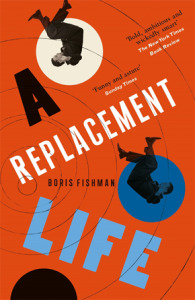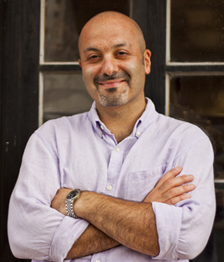The bazaar and the monastery
by Boris Fishman
“A memorable debut by a wonderfully gifted young writer.” Joyce Carol Oates
The Spring 2015 issue of The Paris Review has a scoop to rival a sit-down with Pynchon: The first in-person interview with Elena Ferrante, in which the notoriously reclusive author explains her anonymity: “This demand for self-promotion diminishes the actual work of art,” she says. “The media simply can’t discuss a work of literature without pointing to some writer-hero.”
The sentiment is familiar to anyone who’s spent a little time among authors. Art has been commodified. In today’s pitiless marketplace, it isn’t enough for authors to write – they must also flog their books like door-to-door salesmen. It’s all right if the people in the audience want to say what a fine book it was, but inevitably, they demand to know whether all that stuff in the novel “really happened,” and “what made you want to become a writer,” and why you didn’t end the novel that other way. It’s all part of this horrible reality hunger we’re living through, to borrow the title of David Shields’ 2011 book.
This kind of thinking was so ubiquitous among the authors I read, heard, and spoke to while writing my first novel – “You have to be a performer of the mystery to understand it,” in Nadine Gordimer’s Olympian words – that I approached its publication with not only exhilaration, but dread: I was about to have to go out there and sell my soul, bookstore by bookstore. A year later, however, nearly a hundred appearances from Boca Raton to Seattle behind me, I’ve found my first disagreement with Nadine Gordimer.
The readers I encountered did very often ask what in the book really happened, but I can count on one hand the number who were vulgar about it. Often, I used the opportunity to try to explain the very ideas that make Ferrante and Gordimer object to the podium, for instance the fact that all real-life inspiration must undergo falsification if it is to succeed as drama. Often, I gave examples of how my life became the novel – and didn’t. I usually saw nodding rather than grimaces, and I never felt my achievement, such as it was, diminished by the roadmap I was laying out. (Gordimer lays out the same one in her Nobel Lecture ‘Writing and Being’.)
The curiosity of almost all the aspiring writers I met was earnest and well-meaning. So I very much wanted to share with them the not very glamorous false drafts, rejections, the endless practice.”
Speaking of The Paris Review, some of the greatest help I got as a writer was from its interviews with authors, which cover personal matters alongside the professional. (As does the Ferrante interview, to some extent.) William Styron was a godly abstraction until I read his memoir Darkness Visible and Alexandra Styron’s Reading My Father. Those books didn’t cheapen his novels – they made me feel less alone in my own moments of despair and futility.
Perhaps because I wrote a literary novel, my talks tended to bring me in contact with literary audiences, cousin-in-law Igor notwithstanding. (“Why don’t you learn to write like James Patterson, and then later you can write your literary novels.”) The curiosity of almost all the aspiring writers I met was earnest and well-meaning. So I very much wanted to share with them the not very glamorous story that preceded the glamorous one – the false drafts, the rejections, the endless practice, but then here I was. If an author declines to appear before an audience, he misses an opportunity to deliver the essential news that a writer is a carpenter whose discipline and estrangement sometimes yield moments of extraordinary achievement rather than a genius whose material is handed down from somewhere on high to which only the select have the key. Because that is really what many of the people I encountered seemed to think.
I’m not an introvert, so perhaps this is why I see the marketplace as a place of opportunity rather than pandering. But I benefited from these encounters as well. After a Skype conversation with students at the University of Colorado who’d read my novel, one asked to continue the discussion. The hour-long conversation I had with this young woman was a revelation not only about my novel, but – naturally – my self. Of course, not every interaction is like that. Of course, there was that guy in Florida who demanded to know whether I had the guts to take on a book about genital herpes. But this happened far less often than I expected it.
There’s something else. (Hold on to your hat – there’s sacrilege coming.) Engaging with readers sells books. So often, someone said: “I loved your talk; I’m going to make my book club read this.” That may have happened without my showing up, and it may have happened if I’d written the hit of the year. But there’s rarely more than one All The Light We Cannot See a season, and quite a few Elena Ferrantes who don’t find an audience despite being very good. It is, indeed, a very mercurial marketplace, and I desperately want to sell my books in it, because I’m terrified to imagine having to do anything else. To see it otherwise seems the lucky province of the righteous, the mega-successful and the independently wealthy. I’m not aware of having simplified my talks, or my second novel, as a result of these interactions. But until Amazon figures out how to data-mine a novelist’s subconscious, I understand that this claim must be received skeptically.
An author confines his seduction of a reader to the covers of his novel because he has already said the most intimate, articulate thing he can say – encountering someone who’s read your novel is like meeting for the first time a person you’ve already slept with. But it’s also a way of declining to participate in an interaction the author doesn’t control. If the journalist murders his subject, the novelist renounces his reader. It’s a shame. It’s fun out there; the people you end up meeting tend to surprise you; and you don’t have to bare your shoulder any more than you want to. I prefer the bazaar to the monastery.
 Boris Fishman is a journalist and novelist based in New York. He was born in Belarus and moved to the US at the age of nine. His writing has appeared in publications including the New Yorker, Wall Street Journal and New York Times Book Review. His debut novel A Replacement Life is now out in mass-market paperback from ONE. Read more.
Boris Fishman is a journalist and novelist based in New York. He was born in Belarus and moved to the US at the age of nine. His writing has appeared in publications including the New Yorker, Wall Street Journal and New York Times Book Review. His debut novel A Replacement Life is now out in mass-market paperback from ONE. Read more.
borisfishman.com
Author portrait © Rob Liguori
Read our interview with Boris.
Read an extract from A Replacement Life.
Monday 20 July
Boris Fishman in Conversation with Wayne Hoffman
7 pm
Book Culture, 450 Columbus Avenue, New York, NY
More info

